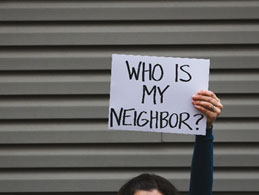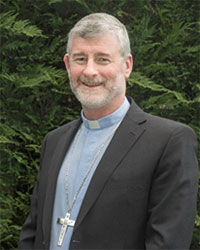Fratelli Tutti was published in October 2020 and is Pope Francis’ third encyclical, which is the kind of document used by popes for what they regard as their most serious and long-term contribution to Church teaching and reflection. Some commentators suggest that this encyclical completes a trilogy for Pope Francis, which began with his apostolic exhortation Evangelii Gaudium (2013) and continued in his environmental encyclical Laudato Si’ (2015).

In Evangelii Gaudium, Pope Francis reflects on the Church’s evangelising mission of inviting all people into relationship with God. Then, in Laudato Si’, he reminds us of our relation to the whole of creation and prophetically calls us to transform how we live in light of our environmental responsibility. Finally, in Fratelli Tutti, he fills out the idea of “integral ecology” from Laudato Si’ by focusing on our relationship with one another as brothers and sisters. We are fundamentally connected to one another, to the whole of creation, and to God the creator, and our lives are most fulfilled when we acknowledge and build up each of these three dimensions in harmony.
Fratelli Tutti is very broad-ranging. Pope Francis considers the way that countries relate to each other and deal with international issues such as migration, trade, war and the place of religion. Turning to the level of society, he covers issues like employment, welfare and political life. Then, at a more personal level, he reflects on our relations with one another in families and local communities. In this article, I will explore some of these more local implications for our life in families, communities and parishes.
The experiences of fragility, uncertainty and isolation that we have been living with over the last year have highlighted how interconnected we are, how much we depend on our relationships with one another and how much we need to strengthen our capacity for personal and considerate communication and support.
In this context, one of the contributions that Pope Francis offers is to emphasise dialogue and encounter between people, in an environment when so much of our communication, especially online, is an impersonal exchange of opinions or a presentation of a photoshopped and misleading ideal. He reminds us that genuine dialogue always begins by wondering what I can learn from others, rather than by seeking ways to convince them to agree with me.
 This approach to others recognises that differences between people do not have to be obstacles that hold us apart, but can be enriching and help each of us to reach new insights, because “no one can possess the whole truth”. While it is important to remain faithful to our own principles, we need to recognise “that others also have the right to do likewise”. This requires humility, moving beyond static and dogmatic standoffs between people that disagree: “We have to stand in the place of others, if we are to discover what is genuine, or at least understandable, in their motivations and concerns” (FT 221).
This approach to others recognises that differences between people do not have to be obstacles that hold us apart, but can be enriching and help each of us to reach new insights, because “no one can possess the whole truth”. While it is important to remain faithful to our own principles, we need to recognise “that others also have the right to do likewise”. This requires humility, moving beyond static and dogmatic standoffs between people that disagree: “We have to stand in the place of others, if we are to discover what is genuine, or at least understandable, in their motivations and concerns” (FT 221).
Pope Francis also offers profound and practical reflections on bringing healing and reconciliation in relationships that have been damaged by conflict and division. As we all know from our personal experience, it is not possible simply to “forgive and forget”; we always carry with us the scars and pain from being deeply hurt. Recognising this, Pope Francis insists that any reconciliation must always begin with acknowledging truth and a commitment to justice, especially in situations where future harm needs to be prevented (FT 226, 241).
However, alongside justice we need to be equally committed to mercy, ensuring that we avoid perpetuating the cycle of recrimination and violence (FT 227, 242). This takes great courage and generosity, but it is ultimately a choice: “Those who truly forgive … choose not to yield to the same destructive force that caused them so much suffering. They break the vicious circle; they halt the advance of the forces of destruction” (FT 251). Perhaps the most dramatic and poignant example that we have of such a choice is Jesus’ refusal to be drawn into violent resistance of the campaign against him by the Jewish and Roman authorities – a choice which led to his crucifixion.
 Along with believers of all faiths, Christians are called both to proclaim the fundamental dignity and fraternity of all people, and also to witness to this through the quality of our relationships with one another. Pope Francis points us to strategies for building up our solidarity through genuine encounter and for working towards healing when our relationships are damaged.
Along with believers of all faiths, Christians are called both to proclaim the fundamental dignity and fraternity of all people, and also to witness to this through the quality of our relationships with one another. Pope Francis points us to strategies for building up our solidarity through genuine encounter and for working towards healing when our relationships are damaged.
Words: Bishop Shane Mackinlay, Sandhurst Diocese
Links: Fratelli Tutti (Encyclical Letter on Fraternity and Social Friendship) Pope Francis
Images: Who is my neighbor, Lightstock
Bishop Mackinlay, supplied



